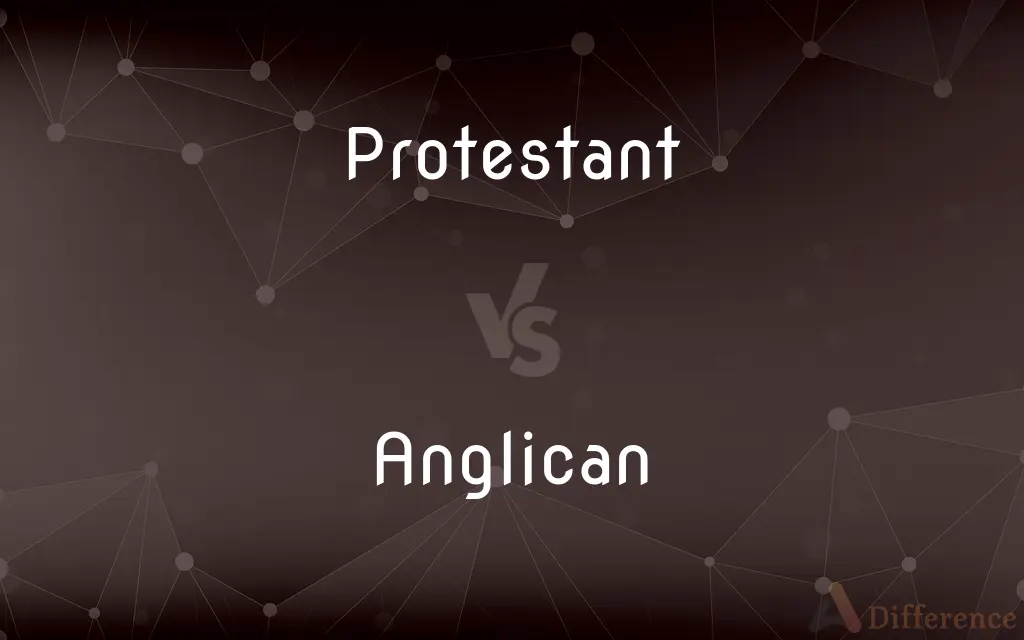Protestant vs. Anglican — What's the Difference?
By Tayyaba Rehman — Updated on October 27, 2023
Protestant is branch of Christianity that emerged during the Reformation, rejecting the authority of the Pope. Anglican is Christian tradition stemming from the Church of England, part of the Protestant Reformation yet maintaining some Catholic practices.

Difference Between Protestant and Anglican
Table of Contents
ADVERTISEMENT
Key Differences
Protestant Christianity arose in the 16th century, with figures like Martin Luther challenging the doctrines and practices of the Catholic Church, leading to various denominations like Lutherans, Baptists, and Methodists.
Anglican tradition originated when King Henry VIII broke away from the Roman Catholic Church, forming the Church of England, which blended Protestant reforms with traditional Catholic rituals.
Protestant denominations often emphasize the authority of Scripture and justification by faith alone, rejecting the Catholic doctrine of papal supremacy and certain sacraments.
Anglicans maintain a middle path, upholding many liturgical traditions similar to Catholicism, but also embracing Protestant principles like the primacy of the Bible.
While Protestantism is diverse with varying beliefs and practices, Anglicanism is identified with the Church of England and its global communion, maintaining a degree of liturgical uniformity.
ADVERTISEMENT
Comparison Chart
Origin
16th-century Reformation
Church of England, 16th century
Authority
Bible; no papal authority
Bible; archbishops but no papal authority
Sacraments
Generally two: Baptism and Communion
Seven, similar to Catholicism
Liturgy
Varies widely among denominations
Book of Common Prayer; more uniform
Relationship with Catholicism
Generally more distinct separation
Maintains some Catholic traditions
Compare with Definitions
Protestant
A member of a Christian church that broke away from Catholicism during the Reformation.
As a Protestant, she believed in salvation through faith alone.
Anglican
Pertaining to the worldwide Anglican Communion, maintaining a historical connection to England.
The Anglican bishop emphasized the importance of liturgical tradition.
Protestant
A diverse Christian tradition emerging from reformist movements.
In his journey, he explored various Protestant denominations.
Anglican
A member of a church governed by bishops, without allegiance to the Pope.
The Anglican community was involved in global missionary work.
Protestant
A Christian who aligns with denominations like Lutheran, Baptist, or Methodist.
As a Protestant, she found the simplicity of the worship service meaningful.
Anglican
A believer in a tradition guided by the Book of Common Prayer.
The Anglican service followed the structured liturgy from the Book of Common Prayer.
Protestant
Adhering to the Christian faith that rejects papal authority.
The Protestant community emphasized the importance of personal Bible study.
Anglican
A follower of the Christian tradition stemming from the Church of England.
As an Anglican, she attended the local Episcopal church.
Protestant
A believer in the principles of the Reformation, including scripture’s primacy.
The Protestant minister focused his sermon on the grace of God.
Anglican
A Christian adhering to a blend of Protestant and Catholic practices.
Anglican churches often have elaborate rituals and vestments.
Protestant
A member of a Western Christian church whose faith and practice are founded on the principles of the Reformation, especially in the acceptance of the Bible as the sole source of revelation, in justification by faith alone, and in the universal priesthood of all the believers.
Anglican
Of or characteristic of the Church of England or any of the churches related to it in origin and communion, such as the Episcopal Church.
Protestant
A member of a Western Christian church adhering to the theologies of Luther, Calvin, or Zwingli.
Anglican
(Archaic) Of or relating to England or the English.
Protestant
One of the German princes or cities that supported the doctrines of Luther and protested against the decision of the second Diet of Speyer (1529) to enforce the Edict of Worms (1521) and deny toleration to Lutherans.
Anglican
A member of the Church of England or of any of the churches related to it.
Protestant
Protestant (also prə-tĕstənt) One who makes a declaration or avowal.
Anglican
English; of or pertaining to England or the English nation; especially, pertaining to, or connected with, the established church of England; as, the Anglican church, doctrine, orders, ritual, etc.
Protestant
Of or relating to Protestants or Protestantism.
Anglican
Pertaining to, characteristic of, or held by, the high church party of the Church of England.
Protestant
Alternative case form of Protestant
A protestant effort
Protestant work ethic
Anglican
A member of the Church of England.
Whether Catholics, Anglicans, or Calvinists.
Protestant
Protesting.
Anglican
In a restricted sense, a member of the High Church party, or of the more advanced ritualistic section, in the Church of England.
Protestant
(slang) Not allowing unsafe sex. (Cf. catholic)
Anglican
A Protestant who is a follower of Anglicanism
Protestant
One who protests; a protester.
Anglican
Of or pertaining to or characteristic of the Anglican church;
An Anglican Bishop
Protestant
Alternative case form of Protestant
Protestant
One who protests; - originally applied to those who adhered to Luther, and protested against, or made a solemn declaration of dissent from, a decree of the Emperor Charles V. and the Diet of Spires, in 1529, against the Reformers, and appealed to a general council; - now used in a popular sense to designate any Christian who does not belong to the Roman Catholic or the Greek Church.
Protestant
Making a protest; protesting.
Protestant
Of or pertaining to the faith and practice of those Christians who reject the authority of the Roman Catholic Church; as, Protestant writers.
Protestant
An adherent of Protestantism
Protestant
The Protestant churches and denominations collectively
Protestant
Of or relating to Protestants or Protestantism;
Protestant churches
A Protestant denomination
Protestant
Making a protest
Common Curiosities
Do both Protestant and Anglican traditions use the Bible?
Yes, both highly value the Bible, but Protestantism generally emphasizes scripture more.
Is Anglicanism considered part of Protestantism?
Yes, Anglicanism is considered a branch of Protestantism but maintains unique characteristics.
Can Anglicans be considered both Protestant and Catholic?
Anglicanism blends elements of both traditions but is generally categorized under Protestantism.
How does church governance differ between Protestant and Anglican churches?
It varies among Protestant denominations; Anglicans have bishops but no central figure like the Pope.
Are the sacraments different in Protestant and Anglican churches?
Yes, Protestants usually recognize two sacraments, while Anglicans may observe up to seven.
Do both traditions have a global presence?
Yes, both Protestantism and Anglicanism have global communities.
Can Anglicans be found outside England?
Yes, the Anglican Communion is worldwide, including churches like the Episcopal Church in the USA.
What is the main difference between Protestant and Anglican?
Protestantism encompasses various denominations that arose from the Reformation, while Anglicanism specifically refers to the tradition of the Church of England.
Do Anglicans follow a specific liturgical book?
Yes, the Book of Common Prayer is central in Anglican liturgy.
Do Protestants have a central authority like the Pope?
No, Protestant denominations typically reject papal authority.
Are the worship styles different?
Generally, Anglican worship is more liturgical and uniform, while Protestant styles can vary widely.
Do Protestant and Anglican churches participate in ecumenical movements?
Yes, many engage in ecumenical efforts to promote Christian unity.
Did both movements emerge around the same time?
Yes, both originated in the 16th century during the Protestant Reformation.
Are there doctrinal differences between Protestant and Anglican beliefs?
Yes, there are differences, particularly in views on sacraments and church authority.
Is the Anglican Church independent of the Roman Catholic Church?
Yes, the Anglican Church is independent and does not recognize the authority of the Pope.
Share Your Discovery

Previous Comparison
Summit vs. Conference
Next Comparison
Thick vs. FatAuthor Spotlight
Written by
Tayyaba RehmanTayyaba Rehman is a distinguished writer, currently serving as a primary contributor to askdifference.com. As a researcher in semantics and etymology, Tayyaba's passion for the complexity of languages and their distinctions has found a perfect home on the platform. Tayyaba delves into the intricacies of language, distinguishing between commonly confused words and phrases, thereby providing clarity for readers worldwide.














































